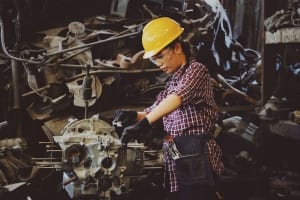How Damaging Can Air Leaks Be to Businesses if They are Not Detected Rapidly?

Identifying air leaks is important because in addition to leaks being the source of wasted air/gas and therefore increased operating costs, they can also be the point of ingress for contamination to the system. Leaks will grow and worsen if restorative action is not taken, which means small leaks can quickly advance to high hidden costs.
How to Detect Leaks
Industrial machines have a high degree of background noise which can veil any obvious evidence of small leaks, making it difficult to understand the scale of leakage. This makes it a secret expense for its operators. Identifying and rectifying all the leak points will reduce operating costs and improve the delivered air/gas quality.
Learning if an air compressor is leaking is a critical aspect of its operation, here we provide some of the easiest ways to detect air leaks:
- Listening for leaks is only possible during a shutdown when the entire system is so silent that massive leaks can be audible. Smaller leaks can be below the hearing threshold, making it difficult to hear the characteristic leaking gas hiss. However, this does not suggest that there are no leaks because even if leaks are heard, they can be very difficult to pinpoint, particularly in areas difficult to access.
- Ultrasonic leak detectors enable testing of out of reach areas to determine if access is required to pinpoint leaks quickly. With a range of up to 8m, it allows operators to promptly survey gas distribution systems with detachable sensors to simplify testing in confined spaces.
- The traditional direct method widely used is to wash over any suspected joints with a soap solution. If there are any leaks, bubbles will form and judging by the number and size of bubbles, and the technician can pinpoint the fault. While this is a straightforward method, it is very time-consuming as every joint has to be tested individually. There are also potential issues for contamination and corrosion.
Why You Need to Fix Leaks
Leaks do not just have detrimental effects on your annual energy expenses; they also decrease operating efficiency and cause productivity loss due to the inevitable drop in air pressure of the system. This could result in reduced equipment life and inefficient operation of tools that rely on compressed air.
Reasons why you should fix air leaks;
Inefficient Tools and Lower Productivity
Drops in air pressure resulting from leaks can significantly impact the productivity of machines by causing tools to operate inefficiently, which in turn creates an overall less-productive environment.
Reduction in Equipment Longevity
Considering that leaks cause a higher demand for airpower than what is typically needed, compressors need to cycle more frequently, which results in a decreased lifespan of your compressed air system. This could be very expensive. It can be avoided through routine maintenance and inspection, so leaks are identified and repaired.
Losses Due to Downtime
If your system is experiencing unnecessary demands, and maintenance is the result, you may be faced with downtime, which can severely hamper productivity — and eventually, profits.
To run a productive and profitable industrial facility, you must keep your air compressors working efficiently at all times. To that end, any air leaks that occur must be identified and fixed before such problems spiral out of hand.
Increased Production Cost
A poorly-operated compressed air system can cost more than water, electricity, steam or even natural gas. Air leaks also can slow a plant’s operation by using more power than necessary to supply compressed air.
